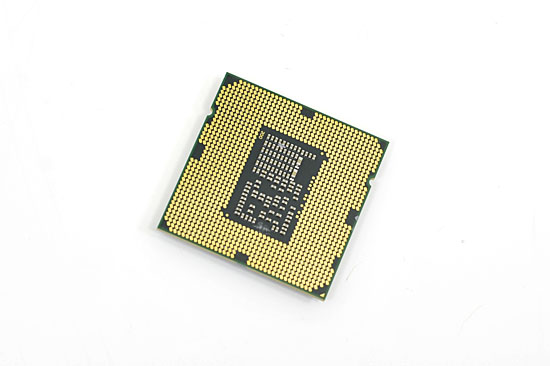The Clarkdale Review: Intel's Core i5 661, i3 540 & i3 530
by Anand Lal Shimpi on January 4, 2010 12:00 AM EST- Posted in
- CPUs
Memory Performance - Not Very Nehalem
Let’s start at the obvious place, memory performance. Nehalem moved the memory controller on-die, but Clarkdale pushes it off again and over to an on-package 45nm graphics core.

To make matters worse, the on-package chipset is a derivative of the P45 lineage. It’s optimized for FSB architectures, not the QPI that connects the chipset to Clarkdale. Let’s look at the numbers first:
| Processor | L1 Latency | L2 Latency | L3 Latency |
| Intel Core i7-975 | 4 clocks | 10 clocks | 34 clocks |
| Intel Core i5-750 | 4 clocks | 10 clocks | 34 clocks |
| Intel Core i5-661 | 4 clocks | 10 clocks | 39 clocks |
| AMD Phenom II X4 965 | 3 clocks | 15 clocks | 57 clocks |
| Intel Core 2 Duo E8600 | 3 clocks | 15 clocks |
L1 and L2 cache latency is unchanged. Nehalem uses a 4-cycle L1 and a 10-cycle L2, and that’s exactly what we get with Clarkdale. L3 cache is a bit slower than the Core i7 975, which makes sense because the Core i5 661 has a lower un-core clock (2.40GHz vs. 2.66GHz for the high end Core i7s) Intel says that all Clarkdale Core i5s use the same 2.40GHz uncore clock, while the i3s run it at 2.13GHz and the Clarkdale Pentiums run it at 2.0GHz.
| Processor | Memory Latency | Read Bandwidth | Write Bandwidth | Copy Bandwidth |
| Intel Core i7-975 | 45.5 ns | 14379 MB/s | 15424 MB/s | 16291 MB/s |
| Intel Core i5-750 | 51.5 ns | 15559 MB/s | 12432 MB/s | 15200 MB/s |
| Intel Core i5-661 | 76.4 ns | 9796 MB/s | 7599 MB/s | 9354 MB/s |
| AMD Phenom II X4 965 | 52.3 ns | 8425 MB/s | 6811 MB/s | 10145 MB/s |
| Intel Core 2 Duo E8600 | 68.6 ns | 7975 MB/s | 7062 MB/s | 7291 MB/s |
Here’s where things get disgusting. Memory latency is about 76% higher than on Lynnfield. That’s just abysmal. It’s also reflected in the memory bandwidth scores. While Lynnfield can manage over 15GB/s from its dual-channel memory controller, Clarkdale can’t break 10. Granted this is higher than the Core 2 platforms, but it’s not great.
What we’re looking at is a Nehalem-like CPU architecture coupled with a 45nm P45 chipset on-package. And it doesn’t look very good. If anything was going to hurt Clarkdale’s performance, it’d be memory latency.










93 Comments
View All Comments
rainman1986 - Monday, January 4, 2010 - link
I'm puzzled by the results for this cpu, I'd have thought it would be close to the 920, but it was much slower than the i3 and i5.Did I miss something?
rainman1986 - Monday, January 4, 2010 - link
Sorry, not the 860, the 870 was slower (but the 860 would have been just a little slower than that!)Still, what gives?
deruberhanyok - Monday, January 4, 2010 - link
Possible responses:"I had no idea it had a retro mode!"
"So these processors can run Ultima IX acceptably then?"
"My eyes! The goggles, they do nothing!"
"Intel HD graphics: bringing extreme video quality to 2001's hottest titles!"
And so on.
vol7ron - Monday, January 4, 2010 - link
The Clarkdale Unencrypted score is shown, could you also display the Lynnfield Unencrypted score.To use the unencrypted Clarkdale as the control for Lynnfield doesn't seem right since there are differences between the two procs. It would make more sense to compare
[Lynnfield Encrypted Score]/[Lynnfield Unencrypted Score] to [Clarkdale Encrypted Score]/[Clarkdale Unencrypted Score]
Thanks,
vol7ron
SydneyBlue120d - Monday, January 4, 2010 - link
Thanks a lot for the great review!When You'll be back from CES, I'd like to see a test of:
- Pentium G9650 (the great absent for the corporate/office world);
- Flash 10.1 and BR/MKV HTCP with integrated gfx;
Thanks a lot :-)
SydneyBlue120d - Monday, January 4, 2010 - link
Forgot to ask:Is the integrated gfx DX 10 or 10.1? Will it support Direct2D?
Thanks
ruetheday - Friday, January 8, 2010 - link
yes to DX10 and Direct2Dvol7ron - Monday, January 4, 2010 - link
Raja,Good article. I like how you re-addressed topics that you originally discussed on the opening page, with a more concise statement on the pages that followed. For instance, when talking about the memory on/off die. You gave a decent bit of info on page 1 and then a quick rememberance on page 2.
--- More will come once I finish reading the artice :) ---
vol7ron
Rajinder Gill - Monday, January 4, 2010 - link
Credit goes to Anand for this piece. I only chimed in on the OC side. :)regards
Raja
vol7ron - Monday, January 4, 2010 - link
I noticed something fishy when it said thanks to Raja for the Mobo suggestion. I guess the article's author threw me off :)Great collaboration, regardless.